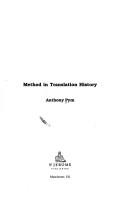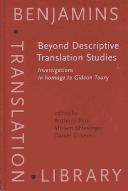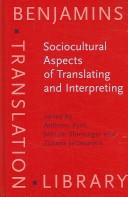| Listing 1 - 6 of 6 |
Sort by
|

ISBN: 1900650126 9781900650120 Year: 1998 Publisher: Manchester St. Jerome Publishing
Abstract | Keywords | Export | Availability | Bookmark
 Loading...
Loading...Choose an application
- Reference Manager
- EndNote
- RefWorks (Direct export to RefWorks)
Starting from the critical notion that we should be asking questions of contemporary importance - and that 'importance' itself must be defined - Anthony Pym sets about undoing many of the currently dominant models of translation history, positing, among much else, that the object of this history should be translators as people, that researchers are subjectively involved in their object, that cultural systems are based on social will, that translators work in intercultural spaces, and that a model of cooperation through negotiation may be applied to the way translators (and researchers!) work between cultures. At the same time, the proposed methodology is eminently constructive, showing how many empirical techniques can be developed and applied: clear illustrations are given of corpus selection, working definitions, deceptive statistics, and the construction of networks and regimes, incorporating elaborate examples drawn from medieval and modernist fields, as well as finding space for notes on practical problems like funding research. Finding its focus in historical debates, this book cannot help but create contemporary debate: its arguments seek not only to revitalize the historical study of translation but also to develop the wider concerns of intercultural studies.
Translation science --- Historical linguistics --- Translating and interpreting --- History --- Philosophy. --- Methodology. --- Traduction --- Histoire --- Recherche --- 82.03 --- #KVHA:Vertaalhistorie --- Vertalen. Literaire vertaling --- Vertalen --- geschiedenis --- methodologie --- 82.03 Vertalen. Literaire vertaling --- methodologie. --- Traduction - Histoire --- Traduction - Recherche --- Traduction et interprétation --- Traduction et interpretation --- Méthodologie
Book
ISSN: 09297316 ISBN: 9789027224545 9789027272997 9027272999 9027224544 1283902303 Year: 2012 Volume: v. 104 Publisher: Amsterdam John Benjamins Publishing Company
Abstract | Keywords | Export | Availability | Bookmark
 Loading...
Loading...Choose an application
- Reference Manager
- EndNote
- RefWorks (Direct export to RefWorks)
This is about people, not texts – a translator ethics seeks to embrace the intercultural identity of the translatory subject, in its full array of possible actions.Based on seminars originally given at the Collège International de Philosophie in Paris, this translation from French has been fully revised by the author and extended to include critical commentaries on activist translation theory, non-professional translation, interventionist practices, and the impact of new translation technologies. The result takes the traditional discussion of ethics into the way mediators can actively create cooperation between cultures, while at the same time addressing very practical questions such as when one should translate or not translate, how much translators should charge, or whose side they should be on.
Translation science --- Professional ethics. Deontology --- Translating and interpreting --- Moral and ethical aspects --- Traducteurs --- Traduction --- Morale --- Moral and ethical aspects. --- Interpretation and translation --- Interpreting and translating --- Language and languages --- Literature --- Translation and interpretation --- Translators --- Translating --- Vertalen en ethiek --- Vertalen en ethiek. --- Traduction. --- Morale. --- Translating and interpreting - Moral and ethical aspects
Book
ISBN: 9781474261104 1474261108 9781350058309 9781474261135 9781474261111 1474261132 1474261116 9781474261128 1474261124 1350058300 Year: 2016 Publisher: London ; New York : Bloomsbury Academic,
Abstract | Keywords | Export | Availability | Bookmark
 Loading...
Loading...Choose an application
- Reference Manager
- EndNote
- RefWorks (Direct export to RefWorks)
"Many 'translation solutions' (often called 'procedures,' 'techniques,' or 'strategies') have been proposed over the past 50 years or so in French, Chinese, Russian, Ukrainian, English, Spanish, German, Japanese, Italian, Czech, and Slovak. This book analyzes, criticizes and compares them, proposing a new list of solutions that can be used in training translators to work between many languages. The book also traces out an entirely new history of contemporary translation studies, showing for example how the Russian tradition was adapted in China, how the impact of transformational linguistics was resisted, and how scholarship has developed an intercultural metalanguage over and above the concerns of specific national languages. The book reveals the intensely political nature of translation theory, even in its most apparently technical aspects. The lists were used to advance the agendas of not just linguistic nationalisms but also state regimes - this is a history in which Hitler, Stalin, and Mao all played roles, Communist propaganda and imperialist evangelism were both legitimized, Ukrainian advances in translation theory were forcefully silenced in the 1930s, the Cold War both stimulated the application of transformational grammar and blocked news of Russian translation theory, French translation theory was conscripted into the agenda of Japanese exceptionalism, and much else."--Bloomsbury Publishing.
Translating services --- Translating and interpreting. --- Vertaalwetenschap --- Vertaalkunde --- Vertalen en politiek --- Vertaalprocedures --- Vertalen en cultuur --- Vertalen --- Translating services. --- Translating and interpreting --- geschiedenis --- sociale aspecten --- Study and teaching. --- Study and teaching --- Vertaalwetenschap. --- Vertaalkunde. --- Vertalen en politiek. --- Vertalen en cultuur. --- geschiedenis. --- sociale aspecten. --- Interpretation and translation --- Interpreting and translating --- Language and languages --- Literature --- Translation and interpretation --- Translators --- Translating agencies --- Translation bureaus --- Bibliographical services --- Language services --- Translating --- Translation science --- Interpreting services --- Translation and interpreting services --- Translation services --- Translating and interpreting - Study and teaching
Book
ISBN: 9780415837897 0415837898 9780415837910 041583791X 9781315857633 9781317934295 9781317934301 1306320550 1315857634 131793430X 1317934318 Year: 2014 Publisher: London Routledge
Abstract | Keywords | Export | Availability | Bookmark
 Loading...
Loading...Choose an application
- Reference Manager
- EndNote
- RefWorks (Direct export to RefWorks)
Exploring Translation Theories presents a comprehensive analysis of the core contemporary paradigms of Western translation theory. The book covers theories of equivalence, purpose, description, uncertainty, localization, and cultural translation. This second edition adds coverage on new translation technologies, volunteer translators, non-lineal logic, mediation, Asian languages, and research on translators’ cognitive processes. Readers are encouraged to explore the various theories and consider their strengths, weaknesses, and implications for translation practice. The book concludes with a survey of the way translation is used as a model in postmodern cultural studies and sociologies, extending its scope beyond traditional Western notions. This comprehensive and engaging book is ideal both for self-study and as a textbook for Translation theory courses within Translation Studies, Comparative Literature and Applied Linguistics
Translating and interpreting. --- Interpretation and translation --- Interpreting and translating --- Language and languages --- Literature --- Translation and interpretation --- Translators --- Translating --- Vertaaltheorie --- Vertaalkunde --- Vertaalwetenschap --- Vertaaltheorie. --- Vertaalkunde. --- Vertaalwetenschap. --- Translating and interpreting

ISBN: 9789027216847 9027216843 9786612152337 1282152335 9027291675 9789027291677 9781282152335 6612152338 Year: 2008 Volume: 75 Publisher: Amsterdam John Benjamins Publishing Company
Abstract | Keywords | Export | Availability | Bookmark
 Loading...
Loading...Choose an application
- Reference Manager
- EndNote
- RefWorks (Direct export to RefWorks)
Given the relative invisibility of translators and interpreters as an occupation, they are hardly studied as a social group, either in the field of TS or in the sociology of professions. Our research aims to analyze their construction of a sense of an occupational identity and strategies of status improvement, drawing on interviews with six subgroups in the field (literary and non-literary translators, subtitlers, conference, community, court and signed-language interpreters). To go “beyond” the work of a leading intellectual is rarely an unambiguous tribute. However, when Gideon Toury founded Descriptive Translation Studies as a research-based discipline, he laid down precisely that intellectual challenge: not just to describe translation, but to explain it through reference to wider relations. That call offers at once a common base, an open and multidirectional ambition, and many good reasons for unambiguous tribute. The authors brought together in this volume include key players in Translation Studies who have responded to Toury’s challenge in one way or another. Their diverse contributions address issues such as the sociology of translators, contemporary changes in intercultural relations, the fundamental problem of defining translations, the nature of explanation, and case studies including pseudotranslation in Renaissance Italy, Sherlock Holmes in Turkey, and the coffee-and-sugar economy in Brazil. All acknowledge Translation Studies as a research-based space for conceptual coherence and creativity; all seek to explain as well as describe. In this sense, we believe that Toury’s call has been answered beyond expectations.
Traduction --- --Translating and interpreting --- Translating and interpreting. --- Vertaalkunde. --- Vertaalwetenschap. --- Theory of literary translation --- Translation science --- Sociolinguistics --- 82.03 --- 82.035 --- #KVHA:Beschrijvende vertaalwetenschap --- #KVHA:Toury, Gideon --- 82.03 Vertalen. Literaire vertaling --- Vertalen. Literaire vertaling --- Literatuur. Algemene literatuurwetenschap. Vertalen --- Festschrift - Libri Amicorum --- Traduction et interprétation --- Translating and interpreting --- Interpretation and translation --- Interpreting and translating --- Language and languages --- Literature --- Translation and interpretation --- Translators --- Translating --- Toury, Gideon.

ISBN: 9027216754 9786612155536 1282155539 9027293414 9789027216755 9789027293411 Year: 2006 Volume: 67 Publisher: Amsterdam John Benjamins Publishing Company
Abstract | Keywords | Export | Availability | Bookmark
 Loading...
Loading...Choose an application
- Reference Manager
- EndNote
- RefWorks (Direct export to RefWorks)
Translation Studies has recently been searching for connections with Cultural Studies and Sociology. This volume brings together a range of ways in which the disciplines can be related, particularly with respect to research methodologies. The key aspects covered are the agents behind translation, the social histories revealed by translations, the perceived roles and values of translators in social contexts, the hidden power relations structuring publication contexts, and the need to review basic concepts of the way social and cultural systems work. Special importance is placed on Community Interpreting as a field of social complexity, the lessons of which can be applied in many other areas. The volume studies translators and interpreters working in a wide range of contexts, ranging from censorship in East Germany to English translations in Gujarat. Major contributions are made by Agnès Whitfield, Daniel Gagnon, Franz Pöchhacker, Michaela Wolf, Pekka Kujamäki and Rita Kothari, with an extensive introduction on methodology by Anthony Pym.
Tolken --- Vertalen --- Vertalen en culturele identiteit. --- Vertalen en cultuur. --- sociale aspecten. --- Traduction --- Translating and interpreting --- Aspect social --- Social aspects --- tolken --- Interpreting --- Translation science --- Sociolinguistics --- #KVHA:Terminologie --- #KVHA:Vertaalwetenschap --- 82.03 --- Vertalen. Literaire vertaling. Tolken --- Interpretation and translation --- Interpreting and translating --- Language and languages --- Literature --- Translation and interpretation --- Translators --- Translating --- Translators. --- Interpreters --- Linguists --- Translating services --- Traducción e interpretación --- Aspectos sociales --- Libros electrónicos $2 LOCAL --- Aspect social.
| Listing 1 - 6 of 6 |
Sort by
|

 Search
Search Feedback
Feedback About UniCat
About UniCat  Help
Help News
News